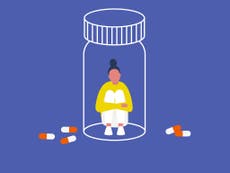Your support helps us to tell the story
From reproductive rights to climate change to Big Tech, The Independent is on the ground when the story is developing. Whether it's investigating the financials of Elon Musk's pro-Trump PAC or producing our latest documentary, 'The A Word', which shines a light on the American women fighting for reproductive rights, we know how important it is to parse out the facts from the messaging.
At such a critical moment in US history, we need reporters on the ground. Your donation allows us to keep sending journalists to speak to both sides of the story.
The Independent is trusted by Americans across the entire political spectrum. And unlike many other quality news outlets, we choose not to lock Americans out of our reporting and analysis with paywalls. We believe quality journalism should be available to everyone, paid for by those who can afford it.
Your support makes all the difference.TV presenter Davina McCall has said that the severe shortage of hormone replacement therapy (HRT) in the UK is “ridiculous” and must be fixed immediately.
McCall, who actively campaigns to raise awareness around menopause, questioned why it is taking the government and HRT suppliers “this long to sort” the problem out.
It comes after tens of thousands of women across the country have reported being unable to get oestrogen gel and other HRT products which they have been prescribed.
Earlier this week, the Royal Pharmaceutical Society (RPS) found that two-thirds of 5,000 premises representatives surveyed have to deal with daily shortages.
McCall told the BBC’s Sunday Morning programme that when she was going through perimenopause – a transitional period before menopause – she “was a mush”.
“When somebody asked me if I was OK because I’d messed up on a TV programme, I said yes. And then when she shut the door and went away, I just burst into tears,” she said.
“Because I thought, ‘I’m not OK, I think I’ve got a brain tumour, or I’ve got Alzheimer’s or something – help me’.”
Menopause is a naturally occurring process that takes place when a woman’s oestrogen levels decline between the ages of 45 to 55. However, it can begin before the age of 40, which is known as premature menopause or premature ovarian insufficiency.
The decline of oestrogen can lead to sometimes debilitating symptoms that can have a significant impact on women’s everyday activities.
Common symptoms include hot flushes, night sweats, vaginal dryness, insomnia, low mood or anxiety, and reduced sex drive.
McCall made a documentary titled Davina McCall: Sex, Myths and the Menopause which aired last year.
Her activism, along with campaigns such as the Menopause Workplace Pledge, which encouraged employers to provide more support for female employees going through menopause, has resulted in increased awareness about the condition and the benefits of HRT.
But suppliers were not prepared for the increased demand for HRT, which has been dubbed by some as the “Davina effect”. Disruptions in the supply chain have also led to the current shortage.
McCall said: “I get really kind of annoyed when people are like, ‘Well it’s Davina’s fault’. You know what, we are actually trying to help women sort out their hormones and live a normal, healthy life.
“There were shortages way before that documentary came out last year. Apparently there is a surplus of hormones in Europe. Why is it taking this long to sort this out?
“It’s a medicine. If there was a shortage in insulin or another drug that women or men had to take, that would get sorted out immediately.”
She continued: “It can be life-threatening not getting women’s HRT. But yes, I do want to get more women on HRT as it would benefit the NHS in a huge way. This has to get sorted. It is ridiculous.”
Last week, health secretary Sajid Javid said he would appoint a HRT tsar to tackle the shortage.
He added: “I want to reassure women that I have listened to their concerns and will not hesitate to take decisive action to ensure they can access the HRT they need.
“We will leave no stone unturned in our national mission to boost supply of HRT – and this next step will ensure women across the UK will be able to reliably access this vtal medication and maintain this lifeline for millions who need it.”




Join our commenting forum
Join thought-provoking conversations, follow other Independent readers and see their replies
Comments